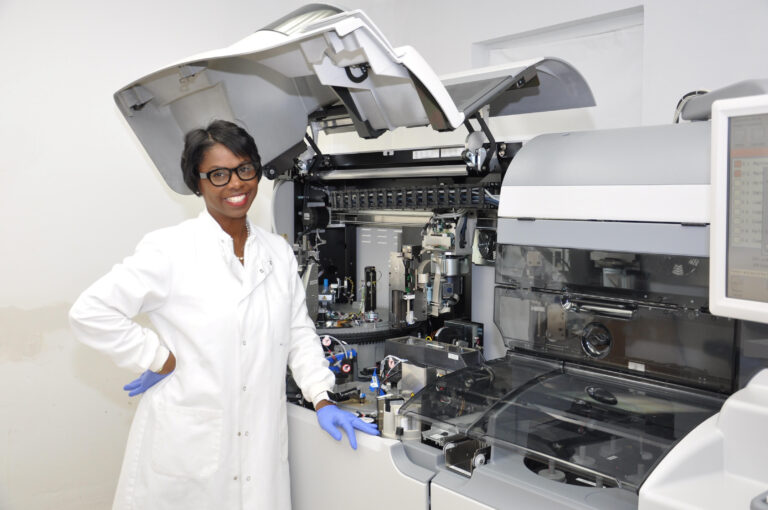(In photo: Dr Desiree Spriggs)
Some people are born with an innate sense of who they are, what they are capable of, and what they want to do in life. Others kind of pinball around until something sparks a passion.
Thankfully, the world needs all types, and we all reap the benefits of amazing women who dived headfirst into a non-traditional field for women: science.
TEAM MICROBE
Rachel Parsons is a microbial oceanographer and research specialist at the Bermuda Institute of Ocean Sciences, a unit of the Julie Ann Wrigley Global Futures Laboratory at Arizona State University.
Did you even know there was such a thing as a microbial oceanographer? Neither did I, but her work is fascinating.
She runs a lab, maintaining multiple projects, but mainly focusing on “the little people” in the ocean, such as bacteria, viruses and archaea: the organisms that break things down to help keep the ocean in balance. A fun fact she likes to share is that phytoplankton, microscopic plantlike organisms, are responsible for 45 per cent of the world’s oxygen. That means every other breath you take comes from the ocean. Who knew?
Ms Parsons’ field of work includes the microbial loop, a process in which bacteria in water consume tiny molecules such as proteins and carbohydrates; the bacteria are then eaten by slightly larger creatures, which reintroduces critical energy from the molecules back into the food web.
Got it?
TEAM MEDICINE
Dr Desiree Spriggs is lab director at Helix Genetic and Scientific Solutions, which is responsible for everything from clinical work – such as aiding physicians in diagnosing, treating and managing patients – to paternity and drug testing, and ancestry testing.
Forensic consulting is another arm of this organisation, which includes DNA testing and molecular testing.
Dr Spriggs was always interested in the medical field, but her strong science background in chemistry and biology gave her flexibility in career choices. However, it was only as opportunities presented themselves that she specialised in DNA and forensic work.
EARLY INSPIRATIONS
Ms Parsons’ spark was lit in high school, where she discovered she was good at chemistry and biology.
Her teacher advised her to intern at the Bermuda Institute of Ocean Sciences, and she hasn’t looked back. She described her educational journey as “convoluted”: it included pursuing a degree in biochemistry, working as a trainee at the bank, then returning to school for her master’s degree. She was supported by people who touted her skills and interests as well as the fact that she was local. And when the opportunities came along, she was ready to grab them!
Dr Spriggs knew from a very young age that she wanted to be a doctor. She had no idea where the urge came from and cannot pinpoint any person or moment that helped her make that decision. She just always knew that this is what she was going to do.
With many credentials and acronyms attached to her name, it feels she uses up the entire alphabet when listing her career path. Her expertise is so evident, I get the impression she could get a DNA sample from the air I’m breathing.
At the time she received her education, you had to become both a jack and master of all trades as you were called upon for any of Bermuda’s many scientific needs.
A WOMAN’S JOURNEY
Ms Parsons believes that marine science is a challenging career path with few jobs locally but said that the medical sciences field is ever open to willing, capable people – so there are increasing opportunities for women, from physiotherapy to kinesiology, from pharmaceutical work to research.
Dr Spriggs never felt any disadvantage as a woman, even as a Black woman in Scotland, but was cognisant of her abilities and what made her a bit of an anomaly. She didn’t think about racism or gender equality but was confident that she was on the right path and doggedly pursued her dreams.
The multicultural teaching environment of Glasgow impacted her in a positive way, and she would encourage locals to get international exposure as much as possible.
“I did not experience overt racism or gender inequality in any way,” she said.
“Because others had paved the way before me, it was more about having one common goal for the progression of research.”
FUTURE OPPORTUNITIES
Outside medicine, Dr Spriggs believes there are several opportunities in science in Bermuda. You can improve your prospects by getting a mentor and international experience.
When it came to pursuing her dreams, her father always told her to “reach for the stars” and so she “just got on with it”.
Do you think you may be interested in the sciences? Do you see yourself in these types of roles? Be sure to get into schools with accreditations and certifications recognised in Bermuda, and investigate the area you would like to work in.
Get what local experience you can, such as the BIOS programme organised by Kaitlin Noyes, director of education and community engagement, which selects Bermudian students to broaden their knowledge and learn about operations in an active research station.
Opportunities exist here, especially for Bermudians, so network to find out more.
The need for women in the sciences has become more globally recognised in recent years. By actively empowering women in the sciences and letting go of preconceived notions of our abilities and interests, we can ensure a multidimensional approach to present and future challenges. We run the world! Watch us work.

